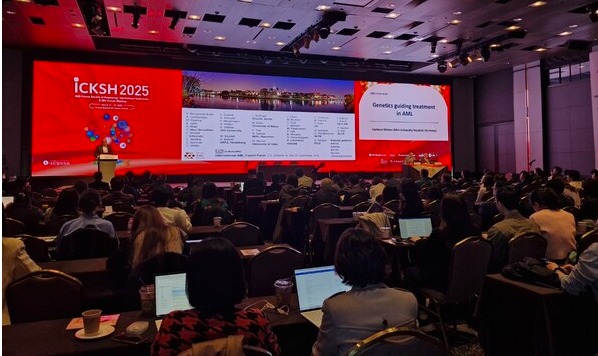More than 1,200 experts from 34 countries gathered in Seoul last week to discuss the latest research and developments in hematology.
The Korean Society of Hematology held the International Congress of the Korean Society of Hematology 2025 (ICKSH 2025) from Thursday to Saturday at the Grand Walkerhill Seoul.
Established in 2018, ICKSH has emerged as Asia's premier international hematology conference in just seven years, with attendance increasing yearly.

The International Congress of the Korean Society of Hematology 2025 (ICKSH 2025), hosted by the Korean Society of Hematology, was held last Thursday to Saturday at the Grand Walkerhill Seoul.
t has become an essential event for hematology professionals in Asia, including Japan, India, China, Thailand, and Malaysia, and is now attracting top experts from the United States, Canada, and Europe, including Germany and Russia.
ICKSH 2025 featured 102 invited lectures and 267 oral and poster presentations on various topics, including benign blood diseases, hematologic malignancies, coagulation/thrombotic disorders, and transfusion medicine.
Notably, world-renowned experts in myeloproliferative neoplasms, multiple myeloma, and acute and chronic myeloid leukemia shared their latest findings in keynote lectures, enhancing the value of ICKSH 2025.
For instance, Professor Sattva S. Neelapu (The University of Texas MD Anderson Cancer Center, USA) explained the future of CAR T-cell therapy for lymphomas in a presentation titled “CAR T-cell Therapy for Lymphomas: Current and Future Trends; Professor Ayalew Tefferi (Mayo Clinic, USA) presented “Myeloproliferative Neoplasms: 2025 Update”: Professor Fabio Malavasi (University of Torino, Italy) spoke on “Evolutionary Legacy in Science and Clinical Medicine of Human CD38, a Catalytic Signaling Receptor”: and Professor Timothy Hughes (South Australian Health and Medical Research Institute (SAHMRI), Australia) presented “New discoveries that will shape future therapies in Chronic Myeloid Leukemia,” providing participants with innovative treatments and research directions.
ICKSH 2025 also featured an Asian session, highlighting research achievements from Japan, Taiwan, Thailand, and Vietnam.
In addition, a symposium held jointly with the American and European societies of hematology demonstrated the importance of international collaboration.
“ICKSH 2025 has become an important platform for international academic exchange and research by introducing domestic and international research achievements in the field of hematology to the world and strengthening academic networks,” said Kim Seok-jin, president of the Korean Society of Hematology. “The congress was a valuable opportunity to reaffirm the academic capabilities and leading role of the Korean Society of Hematology in hematology.
Kim continued, “We will continue strengthening international cooperation to further contribute to advancing blood disease treatment and research.”